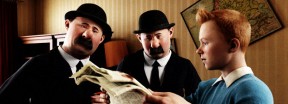Should a film, even one that blurs the line between live action and animation engage your emotions or is the flash of a soul too much to ask for in a multi-million dollar franchise, that painstakingly brings to life, every ripple in a sunlit, heaving ocean, every wave of a caramel sandscape? The Adventures of Tintin :The Secret of the Unicorn is a Steven Spielberg film afterall and you cannot watch it without filtering it through all that Spielberg represents. Epic greatness.
And this film partially shows why he is the legend we bow unquestioningly before. There is a universe of details that you lose yourself in the moment you place those 3-D glasses on your nose.There is that wealth of imagery you would associate a full blown Indiana Jones adventure with. The Tintinology is more or less is in place but as this year’s dark and brooding Rango has shown us as have many other animated films over the years that when technology serves emotion or a philosophical allegory, we watch a film not just with our eyes but our heart and spirit. This one does not really have an allegory though there is a treasure, the battle of a cuddly dipsomaniac for his ship and his self-respect and Tintin telling you as he enters a cloud of death, “We can’t turn back now.”
Belgian illustrator Georges Remi ( Herge to us) would have been pleased with the visual richness but this could have been a better film with a polyphonic plot rather than a one note derivation of the Pirates of the Caribbean films.
Also Morocco in keeping with a typical American caper is depicted as an exotic excuse to construct a chase sequence across the cityscape rather than a real place populated with real people. But we are perhaps nit picking and film viewing is a subjective experience in the end. The film has opened to uproarious welcome in India and it is serving its purpose as an entertainer though you watch it in a curiously detached manner. There are the occasional moments of delight when Snowy, the hugely likable woof woofing, tail wagging side kick saves the day again and again with his fierce loyalty and resourceful love. Andy Serkis offers moments of mirth as Captain Haddock who can fuel a doddering airplane with his alcohol infused breath and can’t recognise himself when he is sober. And there is Tintin who has the voice of Jamie Bell but reminds you of a very young Neil Patrick Harris without his delicious sense of humour.
The director and screenwriters Steven Moffat, Edgar Wright and Joe Cornish never really dig deeper in a story about lost heroism and redemption and give us a calorific rush but little nutrition for the soul. There are a few clever inserts like the Herge like portrait artist who sketches Tintin in a flea market. The story of a 17th century lost treasure, a race against time on a steamer, a boat, a plane and on the sails of sheer will power to beat Sakharine (Daniel Craig) the evil usurper of legacies, moves swiftly, smoothly across continents negotiating perilous seas and scorching sand dunes.
The props and the faces, the ship crane duel, the sabre ratting, fire breathing ships, the Moroccan bazaars and palaces, the seamless shifts between locations are all worth the price of admission. But Tintin as a character remains flat, uninspiring and the film refuses to be more than what it is. An adventure leading to a sequel.
Reema Moudgil is the author of Perfect Eight (http://www.flipkart.com/b/books/perfect-eight-reema-moudgil-book-9380032870?affid=unboxedwri )








is a bit of soul too much to expect….
Enjoyed reading this as always.